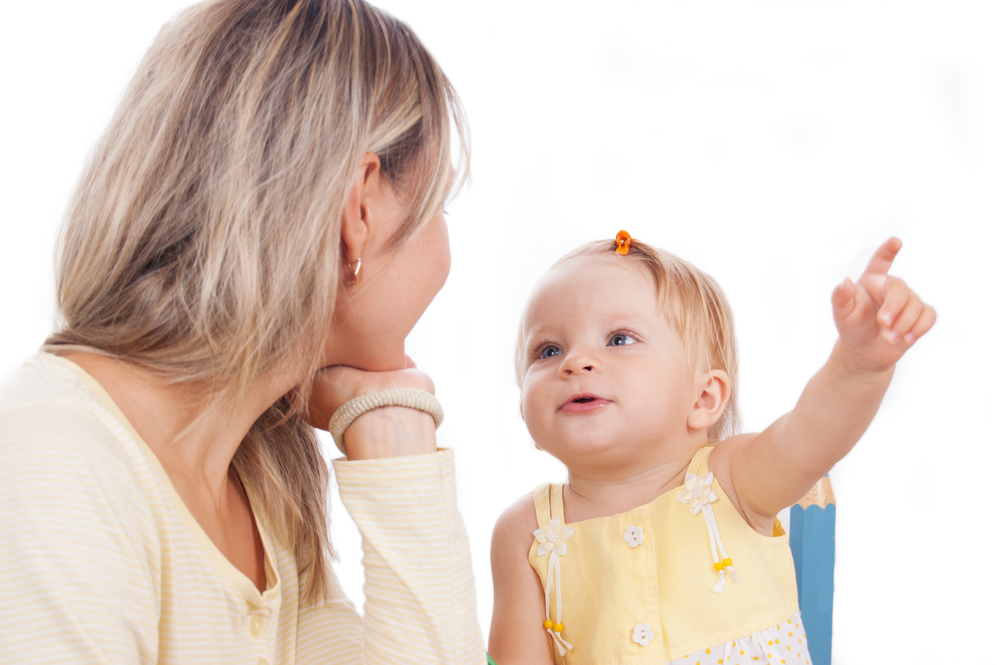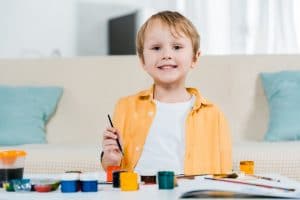Expert tips by Jan Jones (Early Childhood Educator)
Communication happens when one person sends a message to another person. You can send the message in a variety of ways, including facial expressions, gestures and words.
Communication is an essential part of life, through communication we connect with others, make our wants and needs known, share ideas and let people know how we feel.
Whenever people do things together and respond to one another they are interacting. This is the basis of a two-way communication.
Children may communicate in the following ways:
There are many ways to communicate, some more appropriate than others. Yet everything your child does communicates something to you.
- By crying or screaming.
- By moving their bodies toward people and things that interest them or away if they don’t.
- By using gestures or facial expressions.
- By reaching for things they want.
- By taking your hand to get you to do things for them.
- By looking and pointing at things.
- By communicating with pictures.
- By making sounds.
- By using words or sentences.
- By repeating your words (echolalia).
Why children can have difficulty learning to talk:
Hearing problems: temporary medical conditions can affect children’s hearing as well as biological hearing problems.
Slower muscular development: some children find it harder to make the rapid movements needed to make speech.
Slower understanding of adult language.
Less practice interacting with people: some children spend less time interacting with people and practising their communication. In addition, some adults do not wait long enough for children to respond.
Too passive a role in social life: some children are always on the taking side of communications rather than the giving side. This can be because the adults around them have low expectations of children and do not engage them in communication because they do not expect them to understand.
Old non-verbal communication works too well.
People talk for them.
Too much playing alone.
Too much performance language, not enough social talk: much of the language we teach our children, like numbers and colours, are not very useful in daily communication. Children need a practical life vocabulary and practice in the easy conversations that build friendships.
Encouraging children to communicate:
Parents are excellent early language teachers as they adapt their language and conversation with their child on a regular basis. You can encourage your child to communicate in the following ways:-
- Play frequently with your child in ways that your child plays.
- Match your child’s communications – imitate their actions and sounds.
- Wait for your child to talk – don’t do all the talking.
- Take turns to talk – talk as much as your child does.
- Share with your child the enjoyment of communication by singing songs or saying nursery rhymes together.
- Don’t rush your child into words; communicating with sounds comes first.
- Accept any pronunciations at first – he won’t talk like an adult until he practises a lot.
- Translate your child’s own language of sounds and movement into a word.
- At first, respond to your child’s little sounds and actions as communications. After your child is talking regularly, respond more to your child’s words than gestures or sounds.
- Reading time can begin from the very earliest age. Although children may not understand the content, they will associate the sound of their parent’s voice with close physical contact.
Uses of language:
Children use language for a range of purposes; to establish relationships with others, to make requests and express their feelings, and often they just like to play with the sounds and rhythms of speech. It is helpful to remember that children understand more language than they can produce.
Professionals who can be of assistance if you believe there are issues in relation to your child’s communicative ability are:
- Speech Pathologist: Advice is given to families on how to encourage language development. Sometimes alternative methods of communication, such as sign language, are taught to assist communication skills.
- Social Worker: Provides counselling, referrals or information about services available and support for families who have children with special needs.
- Psychologist: Assesses and provides advice on children’s overall development and in specific areas such as learning, emotional or social development.
- Paediatrician: A doctor who specialise in children’s health and development. Paediatricians work closely with others and can make referrals to appropriate specialists.
Case story – Lorraine and Liam
When I became concerned about helping my son Liam’s communication, I believed that I needed to act like a teacher and bathe him with non-stop language. I gave him little time to communicate and I over-stimulated him to the point of frequently losing his attention. I was hoping and searching for the signs of words and I ignored many of the little things he could do. I showered him with questions and kept making demands of him to come into my world. Saddest of all, Liam and I had little fun together.
But then I learned all the important things Liam needed to do for speech and I began listening for and supporting many of Liam’s little non-verbal behaviours that I had previously ignored. One of the hardest things too do was ‘sharing control’ – I had been in such a deep habit of questioning and commanding that it took me quite a while to learn that the less I controlled our interactions, the more Liam communicated. I learned the habit of ‘matching’ – by trying to act and communicate in the ways he did, and I learned to wait for Liam to take his turn This reduced my over-stimulation of him and I found that the more I matched, the more he stayed and communicated. It was hard to learn to be a play partner, but the more I did it, the more social and communicative Liam became.
These habits may seem normal and easy, but I really had to work on them and still do. The happiest part of my learning was to find how important it is to have fun in an emotionally connected and playful way. Now Liam is conversing in sentences but I still use the same strategies to help him learn to participate in near-adult conversations.
For more fantastic tips see our Early Childhood articles














